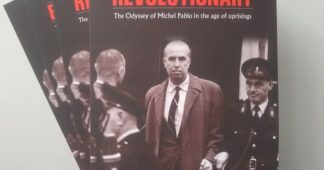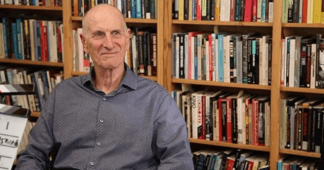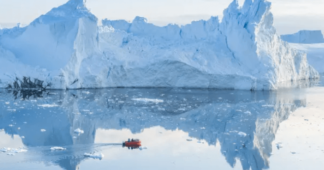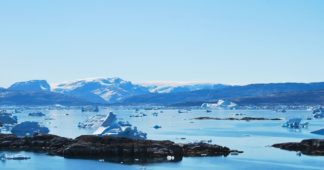By Rowan Cahill
Sep. 19, 2023
At Sydney University in 1970 Hall Greenland and I were part of a small Master of Arts (History) class tended by colonial historian and conservative liberal Professor John Manning Ward, later Vice Chancellor of the university. Always impeccably dressed in three-piece suit, collar and tie, he bore himself like the lawyer he had trained to be. He wasn’t shy in letting me know in a jovial chortling sort of way that yes, Hall and I were researching and writing histories and were developing relevant skills, but the histories we were writing were not really ‘history’. I was working on a history of trade union political strikes in Australian history, and Hall on aspects of the history of Australian Trotskyism.
It was the sort of post-graduate class that, if you played your cards right, doors to the professional academy might well open. But for some of us, these were not the times to play games. Hall got kicked out of the University for his leadership role in challenging its power structures and mobilising students as a political force. I disengaged in the wake of criminal prosecution and a significant suspended prison sentence resulting from a revengeful frame-up engineered by the notorious NSW (Police) Special Branch.
We subsequently charted lives outside the academy, and my tale is for another time. Hall became a print media journalist, picked up a couple of coveted Walkley Awards along the way, and became serially involved in community campaigns of environmental, social justice, and grassroots democratic kinds. In the early 1980s he was a founder of The Greens in NSW, thus seeding the significant politics of the movement in Australia generally.
Born in 1944 into a progressive inner-city leftist milieu, Greenland quickly established himself on the Sydney University campus as a significant presence. He was part of the legendary Freedom Ride in 1965 that dramatically exposed the depth of rural racism and segregation in New South Wales in relation to Aboriginal people, became a leader of the campus Labor Club, radically edited the student newspaper honi soit, and was prominent in the anti-war and student power movements. It was during this time via the Trotskyist intellectual and political food chain he fell in with that he encountered the work and thoughts of Michel Raptis (Pablo), who he later sought out and meet in Paris in 1968.
The historical project Greenland briefly embarked upon in 1970 remained an undercurrent of his intellectual life. Twenty-eight years after being kicked out of university he delivered with Red Hot: The Life and Times of Nick Origlass (Wellington Lane Press, 1998). Trotskyist Origlass (1908-1996) was a Greenland mentor and comrade for some thirty years, a cantankerous self-educated intellectual, trade unionist, local politician, who came to understand that global issues could be fought locally, and that the local could be global. He was also a conduit of the life, work, and political philosophy of Michel Pablo into Greenland’s life.
As Terry Irving and I noted in our essay “A Shelf of Reds” (2016), Red Hot is a “a radical spatial study of a small area of Sydney (Balmain), its politics, culture, and radical traditions, and of a minor yet important Sydney intellectual/political tradition, Trotskyism, seldom discussed outside of internecine literature. Empathetic, critical, scholarly, enjoyably readable, Red Hot also demonstrates that communities can organise, resist, challenge, and defeat powerful interests and forces, and decisions, often corrupt, made at their expense.”
All the while a broader more ambitious project percolated in Greenland’s intellectual and historical imagination. It took the COVID lockdowns to provide the monastic conditions and impetus propitious for its realisation. Thus his recent The Well-Dressed Revolutionary: The Odyssey of Michel Pablo in the age of uprisings (Resistance Books, London, 2023). Use of ‘Odyssey’ in the title is biographically obvious in relation to Pablo as I will explain, but in a sense the book was an odyssey for Greenland too, the culmination of an historian’s voyage that got off to a rough start in 1970 in the faux-gothic cloisters of Sydney University.
For those who have come in late, Michalis Raptis (1911-1996), best known as Michel Pablo – one of his many aliases and pseudonyms, was a leading intellectual and activist in the international cauldron of Trotskyism. ‘Odyssey’ in the title refers to his geographical life, growing up in Cairo and Crete, and significantly involved subsequently in revolutionary ways in Greece, France, Algeria, Chile, Palestine, Portugal amongst other sites. ‘Odyssey’ also refers to the intellectual and political journey of his life, initially with the theological idealism of Tolstoyan Christianity, then to the philosophies of Marx and Trotsky, ending up with an open and creative view of Marxism. With this latter, the revolutionary belief and faith that the way forward to the building of Heaven on Earth is through democratic socialism based on self-management at all levels of human endeavour. ‘Well-dressed’ enters the equation as Pablo, a lifelong revolutionary and egalitarian, was cosmopolitan in his outlook and bearing. As Greenland notes, he “dressed as a bourgeois professional”. His death from a heart attack in Athens made headline news in Greece, and the liberal media in London and Paris ran obituaries.
The dogmatism and internecine irreconcilables that characterise much Trotskyist writing about Trotskyism are absent in Greenland’s account and he succeeds in delivering an engrossing chronological biography of his subject across nearly 85 years of the twentieth century. Constructed and elaborated by an historian with significant journalistic skills, we not only get a biography, but also a history of ideas. When internecine splitting and further splitting of the Trotskyist movement come into play, these are not rendered through the lens of factional politics in the present day as often is the case, but as clashes and conflicts in their times, with Greenland’s focus always on the ideas and strategies in play or at stake.
There is adventure too. Pablo is often on the move, pursued by vengeful authorities, sometimes by forces with murder/assassination in mind. He moves in a world of pseudonyms and aliases and clandestine presses and across borders; he is variously arrested and imprisoned; he is in action from the underground against the Nazi occupation of France; he significantly engages in the Algerian struggle for independence; he works for the governments of Ben Bella in Algeria, and Allende in Chile. And there is love. His lifetime partnership and bond with Elly Diovouniotis, a wealthy radical from an aristocratic background who he met in 1935, is significantly present.
Greenland seeks to explain too how it was that Pablo maintained his rage against the destructions and barbarities of capitalism, variously writing, publishing, organising, campaigning, fronting demonstrations and pickets in his well-dressed way, to the very end. Part of the answer is found in Pablo’s tool-box view of Marxism, and the politics and possibilities of radical democracy and self-management. But that is not enough, and Greenland argues there is another dimension and is upfront in reckoning that Pablo never really “supressed the ethical or spiritual influence of Tolstoy and the Russian’s anarcho-communist pacifism”. Which resonates with me. Back in the mid-1960s when the Australian government conscripted me for the Vietnam War, before I had reached adulthood and gained the right to vote, I wrestled intellectually and emotionally with the problem of who or what had sovereignty over my body and soul: the State? its Army? Its Prisons? Me? Musty and brownly yellowing on the shelves of Sydney University’s Fisher Library I found an ancient copy of Tolstoy’s Christian anarcho-pacifist The Kingdom of God is Within You (1894), but that too is a story for another time.
While Pablo has obviously influenced Greenland intellectually and politically, The Well-dressed Revolutionary is not a hagiography. Greenland writes critically of his subject. Pablo was and is a legend, and the legend is corrected when it is at variance with the realities thrown up by research. Further, Pablo had flaws and contradictions, and Greenland has the emotional distance and wisdom to be able to pick up on these in a way that humanises rather than diminishes his subject.
A great deal of research has gone into the creation of The Well-dressed Revolutionary, along with help and contributions from a large number of people, all of whom Greenland acknowledges at the end of the book. Archives in the UK, France, the Netherlands, and Greece have been significantly drawn on, and translators utilised, again acknowledged. Greenland refers to the “kindness of strangers’’ and to the spirit of cooperation he found during his research. Well yes, but Greenland too has the sort of personality and humanity that facilitates and invites these qualities.
At the end of the book there are twenty-one pages of Endnotes, some of them with content. These are followed by a Name Index, and a detailed listing of the contents of each chapter. More than enough tools here for those who want to use the book for research purposes.
We remind our readers that publication of articles on our site does not mean that we agree with what is written. Our policy is to publish anything which we consider of interest, so as to assist our readers in forming their opinions. Sometimes we even publish articles with which we totally disagree, since we believe it is important for our readers to be informed on as wide a spectrum of views as possible.











